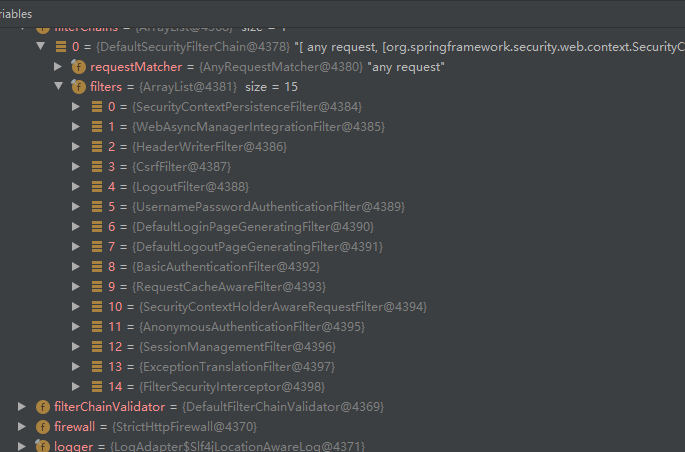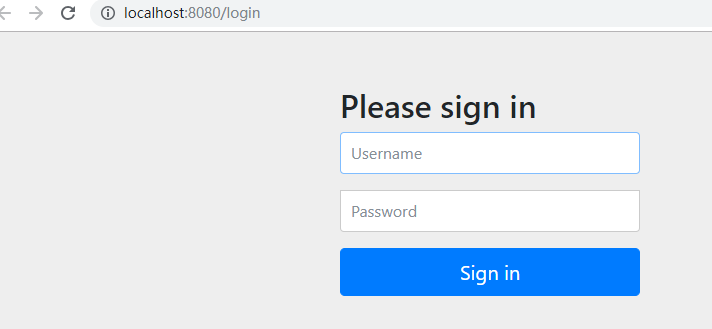Spring Security常用过滤器介绍
Spring Security常见的15个拦截器
1 . org.springframework.security.web.context.SecurityContextPersistenceFilter
首当其冲的一个过滤器,作用之重要,自不必多言。
SecurityContextPersistenceFilter主要是使用SecurityContextRepository在session中保存或更新一个
SecurityContext,并将SecurityContext给以后的过滤器使用,来为后续filter建立所需的上下文。
SecurityContext中存储了当前用户的认证以及权限信息。
2 . org.springframework.security.web.context.request.async.WebAsyncManagerIntegrationFilter
此过滤器用于集成SecurityContext到Spring异步执行机制中的WebAsyncManager
3 . org.springframework.security.web.header.HeaderWriterFilter
向请求的Header中添加相应的信息,可在http标签内部使用security:headers来控制
4 . org.springframework.security.web.csrf.CsrfFilter
csrf又称跨域请求伪造,SpringSecurity会对所有post请求验证是否包含系统生成的csrf的token信息,
如果不包含,则报错。起到防止csrf攻击的效果。
5. org.springframework.security.web.authentication.logout.LogoutFilter
匹配 URL为/logout的请求,实现用户退出,清除认证信息。
6 . org.springframework.security.web.authentication.UsernamePasswordAuthenticationFilter
认证操作全靠这个过滤器,默认匹配URL为/login且必须为POST请求。
7 . org.springframework.security.web.authentication.ui.DefaultLoginPageGeneratingFilter
如果没有在配置文件中指定认证页面,则由该过滤器生成一个默认认证页面。
8 . org.springframework.security.web.authentication.ui.DefaultLogoutPageGeneratingFilter
由此过滤器可以生产一个默认的退出登录页面
9 . org.springframework.security.web.authentication.www.BasicAuthenticationFilter
此过滤器会自动解析HTTP请求中头部名字为Authentication,且以Basic开头的头信息。
10 . org.springframework.security.web.savedrequest.RequestCacheAwareFilter
通过HttpSessionRequestCache内部维护了一个RequestCache,用于缓存HttpServletRequest
11 . org.springframework.security.web.servletapi.SecurityContextHolderAwareRequestFilter
针对ServletRequest进行了一次包装,使得request具有更加丰富的API
12 . org.springframework.security.web.authentication.AnonymousAuthenticationFilter
当SecurityContextHolder中认证信息为空,则会创建一个匿名用户存入到SecurityContextHolder中。
spring security为了兼容未登录的访问,也走了一套认证流程,只不过是一个匿名的身份。
13 . org.springframework.security.web.session.SessionManagementFilter
SecurityContextRepository限制同一用户开启多个会话的数量
14 . org.springframework.security.web.access.ExceptionTranslationFilter
异常转换过滤器位于整个springSecurityFilterChain的后方,用来转换整个链路中出现的异常
15 . org.springframework.security.web.access.intercept.FilterSecurityInterceptor
获取所配置资源访问的授权信息,根据SecurityContextHolder中存储的用户信息来决定其是否有权限。
那么,是不是spring security一共就这么多过滤器呢?答案是否定的!随着spring-security.xml配置的添加,还
会出现新的过滤器。
那么,是不是spring security每次都会加载这些过滤器呢?答案也是否定的!随着spring-security.xml配置的修
改,有些过滤器可能会被去掉。
spring security 过滤器链加载原理
public class DelegatingFilterProxy extends GenericFilterBean { @Nullable private String contextAttribute; @Nullable private WebApplicationContext webApplicationContext; @Nullable private String targetBeanName; private boolean targetFilterLifecycle; @Nullable private volatile Filter delegate;//注:这个过滤器才是真正加载的过滤器 private final Object delegateMonitor; //注:doFilter才是过滤器的入口,直接从这看! public void doFilter(ServletRequest request, ServletResponse response, FilterChain filterChain) throws ServletException, IOException { Filter delegateToUse = this.delegate; if (delegateToUse == null) { synchronized(this.delegateMonitor) { delegateToUse = this.delegate; if (delegateToUse == null) { WebApplicationContext wac = this.findWebApplicationContext(); if (wac == null) { throw new IllegalStateException("No WebApplicationContext found: no ContextLoaderListener or DispatcherServlet registered?"); } //第一步:doFilter中最重要的一步,初始化上面私有过滤器属性delegate delegateToUse = this.initDelegate(wac); } this.delegate = delegateToUse; } } //第三步:执行FilterChainProxy过滤器 this.invokeDelegate(delegateToUse, request, response, filterChain); } //第二步:直接看最终加载的过滤器到底是谁 protected Filter initDelegate(WebApplicationContext wac) throws ServletException { //debug得知targetBeanName为:springSecurityFilterChain String targetBeanName = this.getTargetBeanName(); Assert.state(targetBeanName != null, "No target bean name set"); //debug得知delegate对象为:FilterChainProxy Filter delegate = (Filter)wac.getBean(targetBeanName, Filter.class); if (this.isTargetFilterLifecycle()) { delegate.init(this.getFilterConfig()); } return delegate;
}
protected void invokeDelegate(Filter delegate, ServletRequest request, ServletResponse
response, FilterChain filterChain) throws ServletException, IOException {
delegate.doFilter(request, response, filterChain);
}
}
第二步debug结果如下:


由此可知, DelegatingFilterProxy通过springSecurityFilterChain这个名称,得到了一个FilterChainProxy过滤器,
最终在第三步执行了这个过滤器。
FilterChainProxy
public class FilterChainProxy extends GenericFilterBean { private static final Log logger = LogFactory.getLog(FilterChainProxy.class); private static final String FILTER_APPLIED = FilterChainProxy.class.getName().concat(".APPLIED"); private List<SecurityFilterChain> filterChains; private FilterChainProxy.FilterChainValidator filterChainValidator; private HttpFirewall firewall; //咿!?可以通过一个叫SecurityFilterChain的对象实例化出一个FilterChainProxy对象 //这FilterChainProxy又是何方神圣?会不会是真正的过滤器链对象呢?先留着这个疑问! public FilterChainProxy(SecurityFilterChain chain) { this(Arrays.asList(chain)); } //又是SecurityFilterChain这家伙!嫌疑更大了! public FilterChainProxy(List<SecurityFilterChain> filterChains) { this.filterChainValidator = new FilterChainProxy.NullFilterChainValidator(); this.firewall = new StrictHttpFirewall(); this.filterChains = filterChains; } //注:直接从doFilter看 public void doFilter(ServletRequest request, ServletResponse response, FilterChain chain) throws IOException, ServletException { boolean clearContext = request.getAttribute(FILTER_APPLIED) == null; if (clearContext) { try { request.setAttribute(FILTER_APPLIED, Boolean.TRUE); this.doFilterInternal(request, response, chain); } finally { SecurityContextHolder.clearContext(); request.removeAttribute(FILTER_APPLIED); } } else { //第一步:具体操作调用下面的doFilterInternal方法了 this.doFilterInternal(request, response, chain); } } private void doFilterInternal(ServletRequest request, ServletResponse response, FilterChain chain) throws IOException, ServletException { FirewalledRequest fwRequest = this.firewall.getFirewalledRequest((HttpServletRequest)request); HttpServletResponse fwResponse = this.firewall.getFirewalledResponse((HttpServletResponse)response); //第二步:封装要执行的过滤器链,那么多过滤器就在这里被封装进去了! List<Filter> filters = this.getFilters((HttpServletRequest)fwRequest); if (filters != null && filters.size() != 0) { FilterChainProxy.VirtualFilterChain vfc = new FilterChainProxy.VirtualFilterChain(fwRequest, chain, filters); //第四步:加载过滤器链 vfc.doFilter(fwRequest, fwResponse); } else { if (logger.isDebugEnabled()) { logger.debug(UrlUtils.buildRequestUrl(fwRequest) + (filters == null ? " has no matching filters" : " has an empty filter list")); } fwRequest.reset(); chain.doFilter(fwRequest, fwResponse); } } private List<Filter> getFilters(HttpServletRequest request) { Iterator var2 = this.filterChains.iterator(); //第三步:封装过滤器链到SecurityFilterChain中! SecurityFilterChain chain; do { if (!var2.hasNext()) { return null; } chain = (SecurityFilterChain)var2.next(); } while(!chain.matches(request)); return chain.getFilters(); } }

SecurityFilterChain
最后看SecurityFilterChain,这是个接口,实现类也只有一个,这才是web.xml中配置的过滤器链对象!
public interface SecurityFilterChain { boolean matches(HttpServletRequest request); List<Filter> getFilters(); }
public final class DefaultSecurityFilterChain implements SecurityFilterChain { private static final Log logger = LogFactory.getLog(DefaultSecurityFilterChain.class); private final RequestMatcher requestMatcher; private final List<Filter> filters; public DefaultSecurityFilterChain(RequestMatcher requestMatcher, Filter... filters) { this(requestMatcher, Arrays.asList(filters)); } public DefaultSecurityFilterChain(RequestMatcher requestMatcher, List<Filter> filters) { logger.info("Creating filter chain: " + requestMatcher + ", " + filters); this.requestMatcher = requestMatcher; this.filters = new ArrayList<>(filters); } public RequestMatcher getRequestMatcher() { return requestMatcher; } public List<Filter> getFilters() { return filters; } public boolean matches(HttpServletRequest request) { return requestMatcher.matches(request); } @Override public String toString() { return "[ " + requestMatcher + ", " + filters + "]"; } }





【推荐】国内首个AI IDE,深度理解中文开发场景,立即下载体验Trae
【推荐】编程新体验,更懂你的AI,立即体验豆包MarsCode编程助手
【推荐】抖音旗下AI助手豆包,你的智能百科全书,全免费不限次数
【推荐】轻量又高性能的 SSH 工具 IShell:AI 加持,快人一步
· AI与.NET技术实操系列:向量存储与相似性搜索在 .NET 中的实现
· 基于Microsoft.Extensions.AI核心库实现RAG应用
· Linux系列:如何用heaptrack跟踪.NET程序的非托管内存泄露
· 开发者必知的日志记录最佳实践
· SQL Server 2025 AI相关能力初探
· 震惊!C++程序真的从main开始吗?99%的程序员都答错了
· 【硬核科普】Trae如何「偷看」你的代码?零基础破解AI编程运行原理
· 单元测试从入门到精通
· winform 绘制太阳,地球,月球 运作规律
· 上周热点回顾(3.3-3.9)